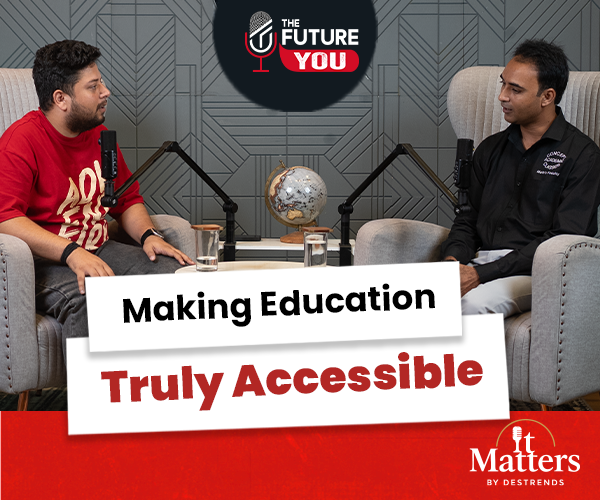Have a Question? Let’s Talk!
Got something on your mind? Drop your question below — our team is here to help and will connect with you shortly.
Follow Us On
EPISODE 6: Making Education Truly Accessible

Education becomes truly accessible not when students simply go to classes, but when they are empowered to learn in a manner that accommodates individuality, values, and aspirations. Aadil Khan, Founder of Concept Classes, has created an ecosystem merging tradition with innovation to show why education matters . His approach redefines accessibility in the landscape of India, rendering classrooms more interactive, student-centric, and ready for tomorrow.
Student-Centric Education at Concept Classes means letting curiosity, pace, and potential guide the learning journey. Rather than rigid systems dictating everything to learners, Aadil insists teaching should be adapted to the learner, not vice versa.
Personalized Student Learning for Personal Development
Accessibility is not just a matter of cost; it is also about addressing needs on a case-by-case basis. Through Personalized Student Learning, every learner in Concept Classes receives individualized mentoring, practice modules, and assessments that heighten their strengths and address their weaknesses.
Classes are collaborative environments that thrive on peer discussions and project-based work. Such a model supports 21st Century Learning, which calls for flexibility, creativity, and analytical thinking. It is in such settings that students learn that the future of education depends on how well systems adapt to individual needs rather than imposing one-size-fits-all solutions.
Teachers operate as mentors rather than simply imparting direct answers. Students are expected to question, delve into topics beyond textbooks, and foster inquiry-oriented thinking. This transforms the class from a passive environment into a place of discovery.
A Symbiotic Relationship of the Traditional and the Modern
At Concept Classes, accessibility to education does not mean an abandonment of culture. The model combines Education Rooted in Indian Philosophy—such as reflection, discipline in thought and action, and community engagement—with modern practices.
- Dynamic assessments provide real-time feedback on performance.
- Adaptive learning apps observe individual progress.
- Digital platforms add elements of fun to practice modules.
At the same time, students partake in reflective exercises, workshops that shape their value system, and mindfulness training. This balance ensures that education is future only if it honors the wisdom of the past while innovating for tomorrow.
It Builds Emotionally Smart and Socially Nimble People
According to Aadil Khan, accessibility touches holistic growth. Concept Classes considers Value-Based Schooling and Emotional Intelligence in Education as essential goals so that learners grow academically, ethically, and emotionally.
Leadership training, facilitated mentorship, and community service projects build resilience, empathy, and social awareness. These programs equip learners for collaborative work, responsible leadership, and meaningful engagement within society. By building emotional intelligence, Concept Classes prepares its students for professional success as well as personal growth.
Schools for the Future: Global Outlook with Local Reference
Concept Classes is not merely a center for academic assistance—it is a reflection of what real schools for the future should be.
Students are trained in critical thinking, adaptability, and digital literacy while remaining firmly rooted in the Indian ethos. Values like community responsibility and mindfulness are woven into the curriculum alongside modern technology and pedagogy.
With this balanced focus, students are prepared to compete globally while staying firmly connected to their culture. Concept Classes proves that good education can be modern, ethical, and accessible so that learners are ready for an interconnected world.
NEP India and the Path to Accessibility
The reforms in nep india spell out inclusiveness, openness, and a multidisciplinary approach to learning. Concept Classes has embraced these principles, preparing students for a future beyond examinations.
- Flexible learning pathways: Every student can progress at their own pace.
- Multidisciplinary exposure: Learning is not confined to one subject.
- Higher education pathways: Guidance includes universities with global ranking and accreditation.
- Sustainable and ethical learning: Projects encourage social and environmental responsibility.
In NEP terms, Aadil wants accessibility to go beyond affordability, creating lifelong learners who are innovative, resilient, and globally knowledgeable.
Education That Prepares for Life
Accessibility, according to Aadil Khan, is about creating classrooms where empowerment, values, and future-readiness converge. By channeling a Holistic Education System, promoting Personalized Student Learning, and harmonizing tradition with innovation, Concept Classes stands as an example of what modern education ought to achieve.
Thanks to NEP-aligned practices, value-based schooling, and emotional intelligence, students are prepared for the real world outside of exams. Concept Classes embodies real accessibility in education by preparing learners for tomorrow while keeping them anchored in today’s values.